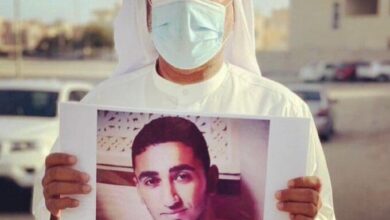European activists demand the arrest of Bahrain’s interior minister

European human rights and political activists urged their governments to arrest Bahrain’s Interior Minister on the backdrop of arbitrary arrests, murder and torture of prisoners of conscience he is involved in.
Activists published video clips on the International Day in Support of Victims of Torture. They accused Interior Minister Rashid bin Abdullah Al Khalifa of being responsible for torturing political prisoners in Jaw Central Prison in Manama.
They considered hosting the Bahraini Minister in European capitals, the last of which was in London last month, as an insult to the victims of human rights violations.
They recalled his long-standing role in overseeing the culture of abuse and the climate of impunity in Bahrain.
Rashid bin Abdullah is one of the essential pillars of the Al Khalifa family, which rules Bahrain with an iron fist. He has been the Minister of the Interior for 16 years.
During these years, he oversaw the arbitrary arrests and torture of protesters, opposition activists, and athletes after the Bahraini government violently suppressed the pro-democracy movement in 2011, according to human rights organizations.
Last May, a human rights organization called on the United Nations Human Rights Council to hold the Bahraini Interior Minister accountable for the ongoing crimes and human rights violations.
Americans for Democracy & Human Rights in Bahrain urged the punishment of Rashid Al Khalifa using the International Magnitsky Act for human rights accountability.
Notorious Minister
Recently, a state of controversy and intense criticism prevailed in Britain against the backdrop of the hosting of the Minister of the Interior Priti Patel of her Bahraini counterpart, who is blamed for the recent torture of political prisoners in Jaw Central Prison.
British media, politicians, and human rights activists criticized the Bahraini Minister’s hosting, which means that the United Kingdom continues to whitewash the violations of the Bahraini regime, they said.
A prominent Labor Member of Parliament, Andrew Gwen, wrote a letter to British Prime Minister Boris Johnson to protest against the meeting of the British Home Secretary and her Bahraini counterpart on May 25.
The British MP criticized Priti Patel’s meeting with Rashid bin Abdullah Al Khalifa more than a month after a violent attack on more than 60 political prisoners by the Bahraini authorities in Jaw Prison on April 17.
In his letter to the British prime minister, Gwen warned that the Bahraini Interior Minister is accused of overseeing the persecution of human rights defenders, journalists, and activists in Bahrain.
Serious Violations
Gwin also made a proposal calling for the government to punish Rashid Al Khalifa by using the International Magnitsky Act for human rights accountability.
The letter also highlights other serious human rights violations recently, including the detention of children as young as 13 years old, who were subjected to beatings, threats of rape and electric shocks, to coerced confessions to charges linked to the protests.
Jurists and activists say that the abuses in Bahrain’s prisons would not have occurred without the Minister of Interior approval.
They assert that Minister Rashid Abdullah Al-Khalifa bears the responsibility in particular for what happens to political prisoners.
They are subjected to a series of violations and threats that have recently escalated to the extent that the detainee Abbas Malallah was killed due to medical negligence in April.
Lawsuits
Therefore, jurists and activists stress the necessity of filing lawsuits against this Minister in international organizations to hold him accountable for his crimes.
Three human rights organizations said in a joint statement that the responsibility for what happened and the safety of the prisoners bear the government of Bahrain and the Minister of Interior in particular.
The organizations are the Bahrain Forum for Human Rights, the Salam Organization for Democracy and Human Rights, and the Gulf Institute for Democracy and Human Rights.
The three organizations called on the government to urgently respond to the request of the UN rapporteurs, especially the special rapporteur on torture, to visit the country.
In 2011, Bahrain witnessed protests inspired by the Arab Spring, and the human rights situation in the Gulf state has deteriorated sharply over the past decade.
In a recent report, Human Rights Watch wrote: “The human rights situation in Bahrain did not improve in 2020. The authorities have arrested, prosecuted and harassed human rights defenders, journalists, opposition leaders and defence lawyers.”




